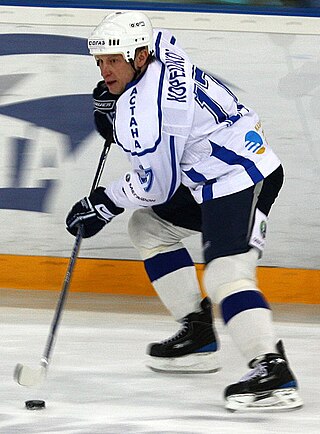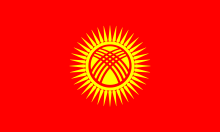
The Unified Team was the name used for the sports team of the former Soviet Union (except the Baltic states) at the 1992 Winter Olympics in Albertville and the 1992 Summer Olympics in Barcelona. The IOC country code was EUN, after the French name, Équipe unifiée. The Unified Team was sometimes informally called the CIS Team, although Georgia did not join the CIS until 1993.

Kyrgyzstan, officially the Kyrgyz Republic, is a landlocked country in Central Asia, lying in the Tian Shan and Pamir mountain ranges. Bishkek is the capital and largest city. Kyrgyzstan is bordered by Kazakhstan to the north, Uzbekistan to the west, Tajikistan to the south, and China to the east and southeast. Ethnic Kyrgyz make up the majority of the country's 7 million people, followed by significant minorities of Uzbeks and Russians.

The Union of Soviet Socialist Republics (USSR) first participated at the Olympic Games in 1952, and competed at the Summer and Winter Games on 18 occasions subsequently. At six of its nine appearances at the Summer Olympic Games, the Soviet team ranked first in the total number of gold medals won, second three times, and became the biggest contender to the United States' domination in the Summer Games. Similarly, the team was ranked first in the gold medal count seven times and second twice in its nine appearances at the Winter Olympic Games. The Soviet Union's success might be attributed to a heavy state investment in sports to fulfill its political objectives on an international stage.

The United States of America has sent athletes to every celebration of the modern Olympic Games with the exception of the 1980 Summer Olympics, during which it led a boycott in protest of the Soviet Union's invasion of Afghanistan. The United States Olympic & Paralympic Committee (USOPC) is the National Olympic Committee for the United States.

Basketball at the Summer Olympics has been a sport for men consistently since 1936. Prior to its inclusion as a medal sport, basketball was held as an unofficial demonstration event in 1904 and 1924. Women's basketball made its debut in the Summer Olympics in 1976. FIBA organizes both the men's and women's FIBA World Olympic Qualifying Tournaments and the Summer Olympics basketball tournaments, which are sanctioned by the IOC.

The all-time medal table for all Olympic Games from 1896 to 2024, including Summer Olympic Games, Winter Olympic Games, and a combined total of both, is tabulated below. These Olympic medal counts do not include the 1906 Intercalated Games which are no longer recognized by the International Olympic Committee (IOC) as official Games. The IOC itself does not publish all-time tables, and publishes unofficial tables only per single Games. This table was thus compiled by adding up single entries from the IOC database.

Russia, referred to by its formal name; the Russian Federation, by the International Olympic Committee, has competed at the modern Olympic Games on many occasions, but as different nations in its history. As the Russian Empire, the nation first competed at the 1900 Games, and returned again in 1908 and 1912. After the Russian revolution in 1917, and the subsequent establishment of the Soviet Union in 1922, it would be thirty years until Russian athletes once again competed at the Olympics, as the Soviet Union at the 1952 Summer Olympics. After the dissolution of the Soviet Union in 1991, Russia competed as part of the Unified Team in 1992, and finally returned once again as Russia at the 1994 Winter Olympics.

Kazakhstan's former long-term President, Nursultan Nazarbayev, has challenged sports organizers to engage 30 percent of the country's population in sports. The state has numerous sports clubs where people participate in various types of sports; sport facilities are available to the general public. Kazakhstan currently hosts major international tournaments; Astana and Almaty hosted the VII Asian Winter Games 2011, which drew teams from 27 countries.

The Federation of International Bandy is the international governing body for the sport of bandy, including the variant called rink bandy. The federation is headquartered in Simrishamn Municipality, Sweden.

Athletes from Germany have taken part in most of the modern Olympic Games held since 1896. Germany has hosted three Olympic Games, in 1936 both the Winter and Summer Games, and the 1972 Summer Olympics. In addition, Germany had been selected to host the 1916 Summer Olympics as well as the 1940 Winter Olympics, both of which had to be cancelled due to World Wars. After these wars, Germany was banned from participating in the 1920, 1924 and 1948 Olympics.

Ukraine first participated at the Olympic Games as an independent nation in 1994, and has sent athletes to compete in every Summer Olympic Games and Winter Olympic Games since then. The first athlete who won the gold medal for the yellow-blues was Oksana Baiul. However, for the first time the Ukrainian national flag and the Ukrainian state anthem sounded in 1992 when Oleg Kutscherenko from Luhansk Oblast won his gold medal in Barcelona as part of the so-called "Unified Team" of ex-Soviet republics.

Uzbekistan first participated at the Olympic Games as an independent nation in 1994, and has sent athletes to compete in every Games since then. Previously, Uzbek athletes competed as part of the Soviet Union at the Olympics from 1952 to 1988, and after the dissolution of the Soviet Union, Uzbekistan was part of the Unified Team in 1992.

Georgia first participated at the Olympic Games as an independent nation in 1994 and has sent athletes to compete in every Summer Olympic Games and Winter Olympic Games since then.

Armenia first participated at the Olympic Games as an independent nation in 1994, and has sent athletes to compete in every Summer Olympic Games and Winter Olympic Games since then.

Turkmenistan has competed in seven Games of the Olympiad, first appearing in 1996. They have never competed in the Olympic Winter Games and are the only post-Soviet state not to have competed in them. Turkmenistan is also the northernmost country in the world to have never competed in the Winter Olympics. Turkmen athletes previously competed with the Soviet Union team and, in 1992, as part of the Unified Team.

Tajikistan first participated at the Olympic Games as an independent nation in 1996, and has sent athletes to compete in every Summer Olympic Games since then. The nation has also competed at the Winter Olympics since 2002. To date, Andrei Drygin is one of two people ever to have represented Tajikistan at the Winter Olympic Games, being his country's sole competitor in 2002, 2006, and 2010.
Rugby union in Kyrgyzstan is a minor but growing sport.

National Olympic Committee of the Kyrgyz Republic, an organization representing Kyrgyzstan in the international Olympic movement. Founded in 1991 and registered with the IOC in 1993.

The United States of America has sent athletes to every celebration of the Winter Olympic Games. The United States Olympic & Paralympic Committee (USOPC) is the National Olympic Committee for the United States.

Ukraine made its Paralympic Games début at the 1996 Summer Paralympics in Atlanta, with thirty athletes competing in archery, track and field, powerlifting, swimming, and sitting volleyball. Vasyl Lishchynskyy won Ukraine's first Paralympic gold medal, in the shot put, and Ukrainians also won four silver medals and two bronze. Ukrainians had previously participated within the Soviet Union's delegation in 1988, and as part of the Unified Team in 1992. Ukraine, following its independence from the Soviet Union, missed out on the 1994 Winter Games, but made its Winter Paralympics début at the 1998 Winter Games in Nagano. Ukraine has competed at every edition of the Summer and Winter Games since then and have done so with remarkable success.

















